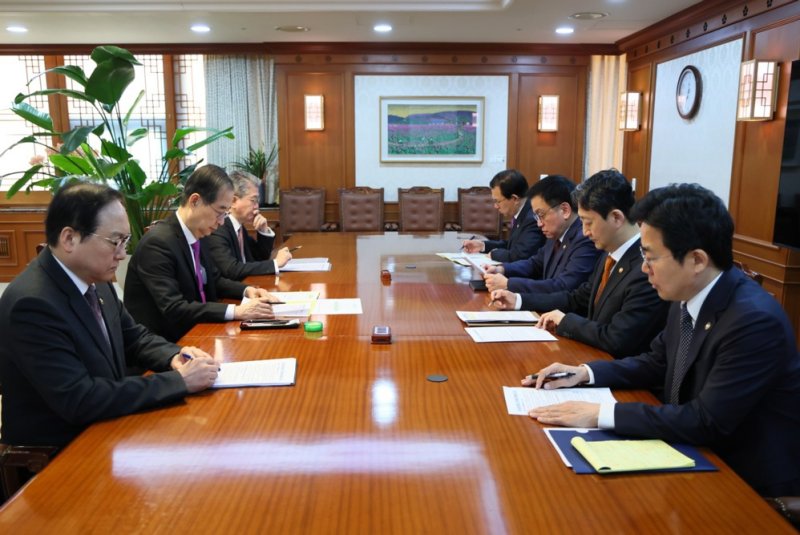Acting Soiuth Korean President Han Duck-soo (second from left), attends a meeting of the task force for strategies of economic security at the government complex in Seoul on Thursday after U.s. President Trump announced tariffs on trading partners. Photo courtesy South Korea Prime Minister’s Office/EPA-EFE
April 2 (UPI) — U.S. trading partners reacted from a range of relief to anger after President Donald Trump imposed tariffs on 180 nations and territories.
Some countries plan to counter with reciprocal duties though others aren’t planning to respond that way.
Sixty nations, the “worst offenders,” were hit with harsher rates up to 50% for the tiny nation of Lesotho and Saint Pierre and Miquelon south of the Canadian island of Newfoundland followed by 49% for Cambodia
Canada and Mexico are exempted from new tariffs because other ones went into effect last month. Canada has a 25% tariff on goods and 10% on energy, with Mexico also at 25%.
It won’t apply for goods from Canada and Mexico compliant with the USMCA free trade agreement.
In all, the U.S. tariff rate will climb from just 2.5% last year to 22%, according to Fitch Ratings. It was 20% in 1930 after the Smoot-Hawley Tariff Act, which set off a global trade war that economists say made the Great Depression worse.
“This is a game changer, not only for the US economy but for the global economy,” Olu Sonola, head of US economic research at Fitch Ratings, wrote in a statement, predicting many nations will plunge into a recession.
Asia
A spokesperson in China said it “firmly opposes this and will resolutely take countermeasures to safeguard its own rights and interests.
China, already subject to a 20% across-the-board tariff on goods, will have a 54% tariff with the 34% boost.
In South Korea, acting President Han Duck-soo ordered the government to “exert all its capabilities to overcome the trade crisis” at an emergency meeting. He described the situation as “extremely serious.” The nation was hit with a 15% tariff.
In Japan, Prime Minister Shigeru Ishiba questioned whether it “makes sense to apply uniform tariffs to all countries,” adding “we’re putting all options on the table in considering the most effective response.” Despite “making the largest amount of investments” to the U.S., the nation received a 24% tariff.
North America
In Canada, Prime Minister Mark Carney told reporters the reciprocal tariffs will “fundamentally change the international trading system.” The U.S. northern neighbor was hit will new tariffs but pointed out planned additional tariffs being considered on pharmaceuticals, lumber and semiconductors “will directly affect millions of Canadians,” Carney said. “We’re going to fight these tariffs with countermeasures.”
In Mexico, President Claudia Sheinbaum said the country will “announce a comprehensive program, not a tit-for-tat on tariffs.”
Oceania
In New Zealand, Foreign Minister Winston Peters said the tariffs were “a day of celebration” as its rate of 15% is better than other nations. Trade Minister Todd McClay ruled out imposing reciprocal tariffs.
In Australia, Prime Minister Anthony Albanese said the 10% tariffs on the country’s exports aren’t “not the act of a friend. Today’s decision will add to uncertainty in the global economy — and it will push up costs for American households.” But he ruled out any retaliatory tariffs on the United States, saying U.S. consumers will “pay the biggest price.”
Europe
The 27-member European Union is preparing countermeasures to the 20% tariffs on imports
“President Trump’s announcement of universal tariffs on the whole world including the European Union is a major blow to the world economy,” Ursula von der Leyen, head of the European Union’s executive arm, said Thursday. “I deeply regret this choice.”
She said the EU is ready to respond.
“We are already finalizing the first package of countermeasures in response to tariffs on steel, and we are now preparing for further countermeasures to protect our interests and our businesses if negotiations fail,” she said.
In Italy, Italian Prime Minister Giorgia Meloni, said she considers the tariffs bad and “we will do everything we can to work a deal with the United States, aiming to prevent a trade war that would inevitably weaken the West in favor of other global actors.”
In Ireland, Prime Minister Micheál Martin said in a video posted on X: they “would work with the European Union to get on “a negotiation pathway with the US to limit the damage of these tariffs.” Ireland was hit by a 20% increase, three weeks after meeting with Trump in the Oval Office. At the time, Trump told Martin he respects what he and Irish lawmakers have done and said he would not do anything to hurt Ireland.
In Britain, which is not part of the EU, Business Secretary Jonathan Reynolds said the government remained “fully focused” on negotiating a deal to strengthen their “balanced trading relationship.”
Africa
Lesotho, a country Trump said last month “nobody has ever heard of,” was hit with a 50% reciprocal rate. It has a population of 2.3 million.
“To my surprise, the country that nobody has heard of is the country where the U.S. has a permanent mission,” Lesotho’s Foreign Minister Lejone Mpotjoane said.
South America
In Brazil, the Ministry of Foreign Affairs is “evaluating all possible actions to ensure reciprocity in bilateral trade, including resorting to the World Trade Organization, in defense of legitimate national interests,” the government said in a statement. Trump imposed a 10% tariff on imports from Latin America’s largest economy.
